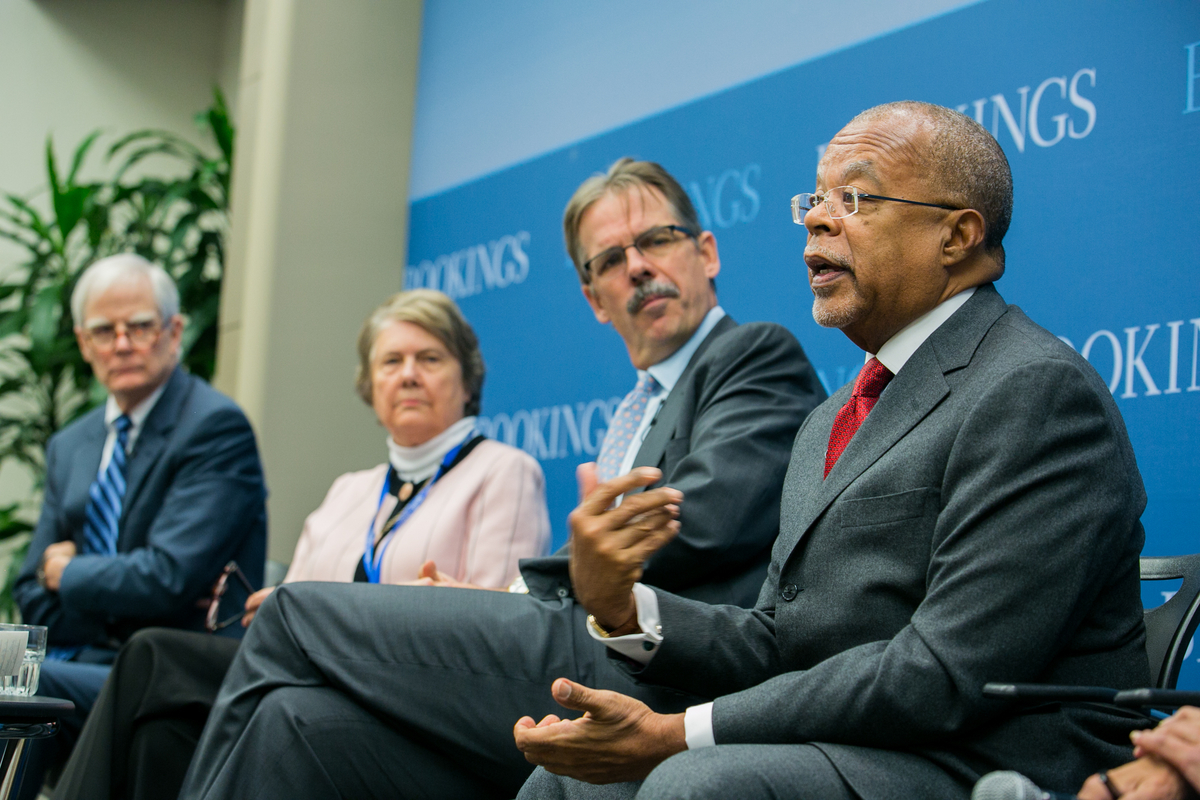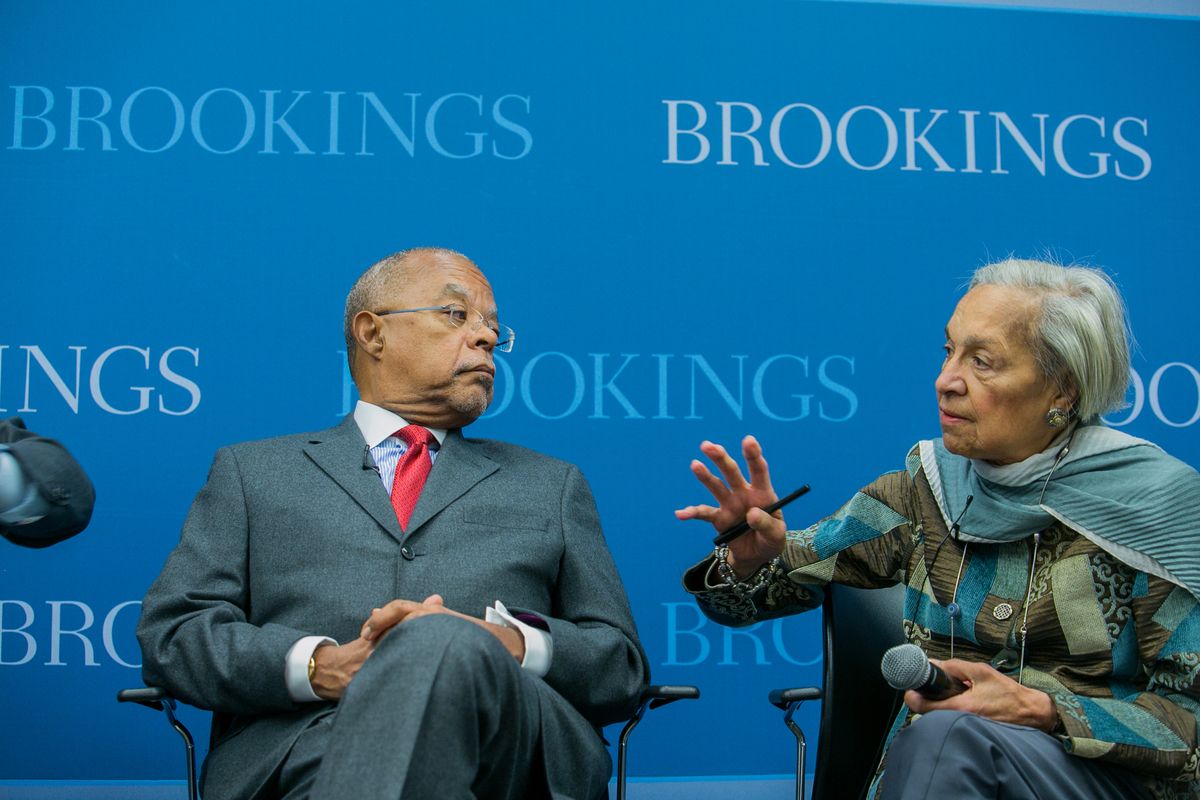Brookings hosted Henry Louis Gates, Jr. to preview and discuss his new documentary, The African Americans: Many Rivers to Cross. After watching segments of the film, panelists discussed issues ranging from affirmative action in education, educational attainment, and economic disparities in the African-American community.
Gates, along with Senior Fellows Isabel Sawhill and Ron Haskins, Guest Scholar Lois Dickson Rice, and moderator Glenn Hutchins, vice chair of the Brookings Board of Trustees, explored the nuances in these issues, including class divides between black and white communities and also within the black community.
 |
| Henry Louis Gates, Jr. (R), with Ron Haskins, Isabel Sawhill, and Glenn Hutchins. (photo: Ralph Alswang) |
When asked if he had benefited from affirmative action, Gates noted that the Class of ’66 at Yale had six black men to graduate; the class “that entered with me had 96 … I never would have gotten in without affirmative action … but it meant that we were allowed for the first time to compete on a more or less level playing field with white kids. Before, there was a strict quota.”
Rice, who lived in segregated rooming at Radcliffe College, said that race and economic issues are “always synonymous,” and told the audience that her Jamaican immigrant parents had a motto: “Don’t ever try to use race as an excuse, nor as an advantage.”
the black upper middle class has quadrupled since 1968 but black children living at or beneath the poverty line is almost identical to what it was, mid 30%, when Dr. King died. — Henry Louis Gates, Jr.
Sawhill said that “there are a whole lot of people in America, younger people particularly, who don’t know this history, don’t know what it used to be like, and therefore need to see this kind of historical piece.”
She also spoke to the role of affirmative action in education and the new case before the U.S. Supreme Court. The questions we should be debating, she said, are: “How long do we need affirmative action—I hope not forever—and secondly, what about class versus race?” Speaking to the sharply-growing class divide, Sawhill said that “the African-Americans who are getting left behind tend to be on the lower part of our social and economic structure. They’re the ones I think we should be worried about the most.”
 |
| Henry Louis Gates, Jr. with Lois Rice. (photo: Ralph Alswang) |
Haskins noted the divisiveness of the affirmative action issue in society, but said that its advantages outweigh the disadvantages. “We’d still be integrating lunch counters if it hadn’t been for government,” he said. But there is still discrimination, he said, concluding that “I think affirmative action is going to be a part of our culture for many years to come.”
Discussion turned to the issue of a black middle class. Sawhill pointed out the racial gaps that persist in the data, demonstrated by lifecycle mobility models such as the Social Genome Project. “There is a lot more falling back amongst African Americans than there is amongst whites even after you’ve achieved this middle-class status,” she said. Haskins, turning to the question of welfare, said that this illustrates the importance of individual decisions. “Individuals make decisions that really reverberate in their future and shape their future to a large extent … until these decisions about having babies, getting married and work change, we’re not going to make great progress.”
Gates noted the divide in wealth within the black community. “We have two nations, both black. So there’s a wealth gap between black and white and there’s a wealth gap between black and black.” Affirmative action, Gates said, “was a class escalator for us” but now “we are perpetuating our class status through affirmative action. … I would even say my kids don’t need affirmative action.”
It would be savvy politically to include an economic element [to affirmative action] because that would appeal broadly across society. I don’t think we can keep playing the slavery card … it’s real but you gotta move on. — Henry Louis Gates, Jr.
Sawhill referred to research in the Brown Center for Education Policy and the Brookings Papers on Economic Activity that are showing “that there is a lot of … undermatching” — meaning academically qualified African Americans who, because they lack certain connections and knowledge, are prepared academically but are not going to the kinds of institutions they should be going to. “This work is showing that we still have a problem here … it’s a much more nuanced problem than outright prejudice and discrimination.”
“The fact is,” Haskins said, “that both low income kids and black kids and many Hispanic kids come to the schools at age 5 or 6, depending on their state, already behind.”
So it follows from that I think that until we do something during the preschool period with parents and with better preschool programs and more …. access for low income kids and minority kids we are not going to be able to do it with schools alone. … The parents and the preschool programs are the two keys.
Many Rivers to Cross debuts on PBS stations on October 22.
Get full event audio and video here.
See also:
• Social Genome Project
• Social Mobility Memos
• Center on Children and Families
Colleen Lineweaver contributed to this post.
The Brookings Institution is committed to quality, independence, and impact.
We are supported by a diverse array of funders. In line with our values and policies, each Brookings publication represents the sole views of its author(s).




Commentary
Many Rivers to Cross Documents African-American History from Juan Garrido to Barack Obama
October 15, 2013